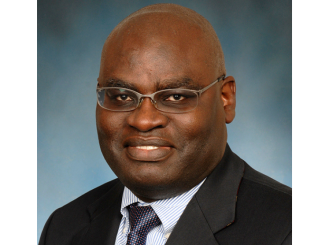May 14, 2021
Clement A. Adebamowo, BM, ChB Hons, ScD, FWACS, FACS, FASCO, FSSO, has a career that spans two continents. He is a tenured Professor in the Department of Epidemiology and Public Health, a member of the Institute of Human Virology, Center for Vaccine Development and Global Health, Program in Oncology, and Center for Research in Aging, associate director of Population Science, and director of Global Health Cancer Research at the Marlene and Stewart Greenebaum Comprehensive Cancer Center, University of Maryland School of Medicine—roles he has held since 2009. Previously, Dr. Adebamowo served as the director of the Institute of Advanced Medical Research and Training and Professor of Surgery in the College of Medicine at the University of Ibadan, and as a Consultant Surgeon and head of the Division of Surgical Oncology at University College Hospital, in Ibadan, Nigeria.
How did you initially choose your current career path? Were there any unexpected detours along the way?
CA: As a surgeon, I have always been interested in research but opportunities in Nigeria were limited. Nevertheless, I conducted epidemiology of breast cancer research identifying risk factors in Nigerian women, clarifying patterns of molecular subtypes, and collaborating with international researchers. I took advantage of my sabbatical leave to complete a doctorate in epidemiology and biostatistics in the U.S. and to strengthen my research skills. I returned to Nigeria and worked with colleagues throughout the country to establish the research ethics regulatory compliance environment and the national cancer registration system for the country, while I continued my research, clinical, and administrative responsibilities.
In the late 1990s, I attended a London meeting on “Cancer in the New Millennium” organized by Dr. Karol Sikora with support from Mr. Kolade Mosuro, a Nigerian businessman, and the conference organizers. At the meeting, I met Dr. Richard R. Love and shared my ongoing research projects on breast cancer incidence by studying the nurses in tertiary hospitals in Nigeria and phased surgical oophorectomy and modified radical mastectomy for management of premenopausal breast cancer in Nigeria. He recommended me to Dr. Walter C. Willett at the Harvard T.H. Chan School of Public Health, who accepted me for training in epidemiology. The rest, as they say, is history.
A desire to expand the scope of my research and explore new scientific hypotheses led to my current appointment and career path as a cancer epidemiologist and population scientist.
Describe your typical work day.
CA: This is highly variable and depending on where in the world I am.
In the U.S., my typical day starts early—some days as early as 4 AM—to align with the formal working hours of my international research sites and the schedule of my collaborators. My day starts with meetings to plan, monitor, and resolve problems at research sites.
This is followed by hours dealing with the work that, these days, arrives by email. While some emails are messages only, most lead to a significant amount of work—reading, annotating, cross-checking, responding with information, etc.
I may spend some time in my wet lab but most of the rest of the day is spent on academic and administrative work related to my institutional assignments in the U.S. I spend 3 to 4 hours a day reading the literature, working on new grant applications, analyzing data, and writing manuscripts. In the fall, I teach a graduate course in cancer epidemiology. During this period, I spend time preparing and implementing the course. I interact with students, guest faculty, etc.
When I am visiting international sites, I spend time working with research associates and collaborators in the field and in the laboratories. I conduct trainings, engage collaborators, attend meetings, and catch up on other responsibilities.
Regardless of location, I spend a considerable amount of time daily in mentoring individuals, groups, or organizations, participating in advisory and other committee meetings, training webinars, conferences, and workshops.
If you have to pick one aspect, what part of your job is your favorite? What part is the most challenging or frustrating?
CA: I have a deep and abiding love and respect for conceptualizing, planning, and designing research projects. This is the favorite part of my job.
The part I find most challenging is writing grant applications and seeking funding. So much has been accomplished in cancer research and so much more needs to be done to translate the fantastic progress in cancer research to improved survival and reduction of pain and suffering.
What do you wish you had known before you chose your career path?
CA: I wish I had known about the significant amount of time dedicated to the administrative, management, and logistics aspects of research, particularly international collaborative research.
Would you recommend this career to someone starting out in oncology?
CA: In a heartbeat! Research invents the tomorrow we desire. It improves the lives of our patients by curing some and enhancing quality of life where cure is not yet possible. It is a powerful force for good by ensuring a healthy population and preventing needless suffering and pain. It engenders huge socio-cultural benefits to researchers, research participants, and their communities. It is an important economic resource with significant impact on many aspects of the society.
What kind of person thrives in this professional environment?
CA: Thriving in cancer research requires high levels of dedication, focus, tolerance for failure, ability for self-directed learning, and resilience. Individuals with these traits are most likely to thrive in the cancer research environment.
Follow Dr. Adebamowo on Twitter.

